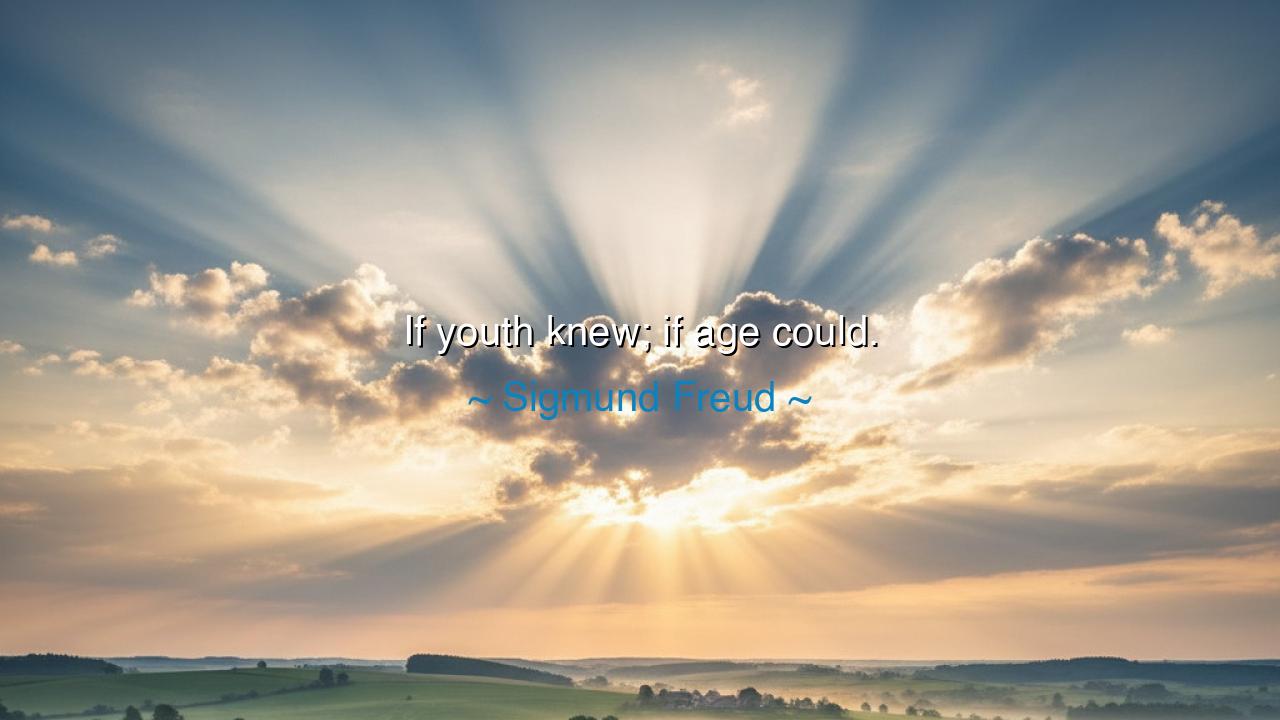
If youth knew; if age could.






"If youth knew; if age could." These words by Sigmund Freud express a timeless reflection on the human condition, a profound understanding of the gap between youth and age. Freud, in his typical analytical style, highlights a tragic irony: the wisdom of age is often absent in the exuberance of youth, while the vitality of youth is lost by the time one gains the wisdom to use it. This quote speaks to the eternal conflict of our lives: the tension between what we could do if we only had the wisdom of experience, and what we wish we had known when we were full of youthful energy. The truth contained within this observation is both painful and enlightening, for it shows us that no matter how much we may desire to combine the best of both, the passage of time often denies us that union.
The ancients, too, understood the fragile nature of youth and age, and the wisdom that each brought. Homer, in his epic poems, weaves the stories of heroes who are at the height of their youth, yet plagued by a lack of foresight that often leads them into ruin. Achilles, for instance, with all his power and skill, could not foresee the cost of his rage, and his actions, driven by youthful impetuosity, led to his untimely death. In contrast, Odysseus, older and wiser, navigates the challenges of life with caution and strategy, yet is forever haunted by his past mistakes. The stories of these great figures reflect the age-old truth that youth and age are often at odds with each other—one filled with potential but lacking experience, the other filled with wisdom but constrained by the body’s decline.
Freud’s words evoke a sense of deep longing for a union between the vigor of youth and the wisdom of age, a pairing that could lead to a life fully realized. In the story of Leonardo da Vinci, we see a man who, in his youth, displayed an extraordinary brilliance, yet spent his later years searching for deeper meaning and understanding of the world. Leonardo’s mind never ceased to seek knowledge, even as his body grew frail. Had he known in his youth what he came to understand in his later years—how the pursuit of balance and the integration of mind, body, and soul were key to his greatness—his accomplishments might have been even more profound. The conflict between youth and age is felt keenly in the lives of those who live with the burden of regret, wishing that they could somehow marry the enthusiasm of their younger selves with the insight they gained later.
In history, we find the same lament: had youth known the power of patience, it could have avoided the rashness of impulsive action. And had age had the strength of youth, it could have acted without hesitation or fear of consequences. Take, for example, the life of Winston Churchill. During his youth, he showed great promise but lacked the full understanding of the weight of leadership and the cost of decision-making. In his later years, after he had gained the wisdom of age, he found himself battling not only political forces but the physical decline of his body. The irony here is palpable: had Churchill known the depths of his capabilities earlier, he could have achieved even more, and had he the strength of youth in his older years, he might have had even greater success in navigating the world’s challenges.
Freud’s quote is not just an observation but a reflection of the human experience. It reveals the fragility of time, the limitations that come with both youth and age. Youth, with all its promise, is often blind to the lessons that age can impart. Age, with all its wisdom, is often confined by the limitations of a body that is no longer as agile or quick as it once was. The great lesson in Freud’s words is that life is a series of trade-offs—we cannot have the boundless energy of youth forever, nor can we retain the insights of age without enduring the cost of time. It is a call to acceptance: to cherish youth while it lasts, and to embrace age with the knowledge that it brings.
The practical takeaway from Freud’s insight is to recognize that the gift of life is in the balance between the energy of youth and the wisdom of age. We should not lament the passing of one for the other but should instead strive to integrate the lessons of both. Younger generations can learn from the experience of their elders, seeking out their guidance while still possessing the energy to act. Older generations, in turn, can stay active and engaged, embracing the opportunities that come with youthful enthusiasm, even if they can no longer run as fast or climb as high. Life, in its fullness, lies in this delicate balance—between the eager, bold steps of youth and the careful, deliberate wisdom of age.
Let us live, then, with awareness of the limits of both youth and age, embracing both in their time, and giving ourselves the grace to learn from each. Youth should seek the guidance of maturity, while maturity should honor the passion and vitality that only youth can provide. In doing so, we will find the key to living a life filled with purpose, balance, and fulfillment, transcending the struggles of time and finding wisdom in both the journey and the destination.






AAdministratorAdministrator
Welcome, honored guests. Please leave a comment, we will respond soon